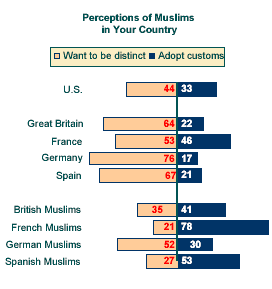The French System of Integration Not so Bad.... after all.
Clearly, a majority of those youths are the children of Muslim immigrants from North-Africa (Algeria, Morroco, Tunisia) and sub-Saharan Africa (Mali, Senegal...) so it is easy to conclude that not only the French social but also racial system integration is a failure, and there is no doubt that there is racism in France.
While the French system of education makes a point in giving (more or less) the same education to the French youths, regardless of their background, the reality is that it is much harder to be economically integrated when you live in deprived ghettos (nothing new there). Does that mean that French Muslims reject the French values, and are the riots the first sign of this rejection?
According to this study by the Pew Center, (via Jerome-a-Paris in European Tribune) it does not seems so - especially if comparing to other European Muslims. What most French Muslims are concerned about is to find a job, but most of them have also embraced French values, including secularism. This is where it gets interesting:
What most distinguishes French Muslims among others in Europe are their self-perceptions. Few Muslims living in France see a natural conflict between being a devout Muslim and living in a modern society. Seven-in-ten French Muslims (72%) perceive no such conflict, a view shared by a virtually identical 74%-share of the French general public. In Great Britain, however, Muslims split evenly (47% see a conflict, 49% do not) while only 35% of the British general public see no inherent conflict between devotion to Islam and adaptation to a modern society.Moreover, when asked whether they consider themselves as a national citizen first or as a Muslim first, French Muslims split relatively evenly (42% vs. 46%) on the issue. Not only is this remarkably different from Muslims elsewhere in Europe (fully 81% of British Muslims self-identify with their religion rather than their nationality, for example) but it is remarkably close to the responses given by Americans when asked whether they identify first as national citizens or as Christians (48% vs. 42%). Perhaps in this, as in other things, Muslims living in France are indeed absorbing the secular ways of their countrymen, among whom fully 83% self-identify with their nationality, rather than their religion.
 However, the younger generation has a more conflictual perception, while 51% of them (those under 35 of age) self-identify first as Muslim, they are as equally (78%) as their elder to say they want to adopt French customs. It seems pretty clear to me that when you're jobless or see yourself with little economic opportunity, you may be more prone to some soul-searching in all kinds of ways.
However, the younger generation has a more conflictual perception, while 51% of them (those under 35 of age) self-identify first as Muslim, they are as equally (78%) as their elder to say they want to adopt French customs. It seems pretty clear to me that when you're jobless or see yourself with little economic opportunity, you may be more prone to some soul-searching in all kinds of ways.
In any case, those results certainly show that an overwhelming majority of Muslims have embraced French values, including the French system of assimilation (which is based on ignoring differences), and that makes the French Muslims apart from their fellow European Muslims - only 53% of Muslims in Spain, 41% in Britain and 30% in Germany say they want to adopt local customs.
So while there is certainly a great need for better economic integration and more job opportunities, the French do not need to look elsewhere in Europe for a better system of integration of their immigrants. This is good news, since France has the largest Muslim community (5 million or so, i.e. between 8% and 10% of its population) in Europe.
2 Comments:
I think it’s very important to consider and help the girls in their teenage years born in France. Generally they are well integrated, living as French natives, wearing fashion clothes, short skirts, low-necked and even observing Ramadan whereas some of their brothers don’t.
However even when their parents are well integrated it cant be a big deal for some of them to manage with brothers who are unemployed or colleges because of racism. So they finally don’t know any longer what to do and even who they are, feeling blamed and torn between the two communities.
In the long run wearing the veil can be a way to show their difference. I’ve noticed that gradually they are more and more to do it. One of my colleges, a Moroccan man also noticed it. He reported that in his country few of the girls are warped and he’s very surprised and worried by this shift.
Michèle from the outer suburbs of Paris
I do agree that a lot of those moving to here would consider themselves integrated. However, the other aspect of that is whether the French consider them to be integrated and in my experience they don't, at least not first generation immigrants.
It isn't just the muslim population who, in my view, have more difficulties but even the likes of us British whites moving over here.
We have found that although we are doing everything that we can to integrate, it is a one-way integration as the French don't really accept us as being part of the fabric of French society.
If I were a muslim I would see that as racist but I think that in reality it is simply that the French are anti anything that isn't truly French. For immigrants I suspect that means you need to be 2nd or even 3rd generation before they'd consider you as being French, regardless of what you may consider yourself.
Arnold
www.foreignperspectives.com
Post a Comment
<< Home